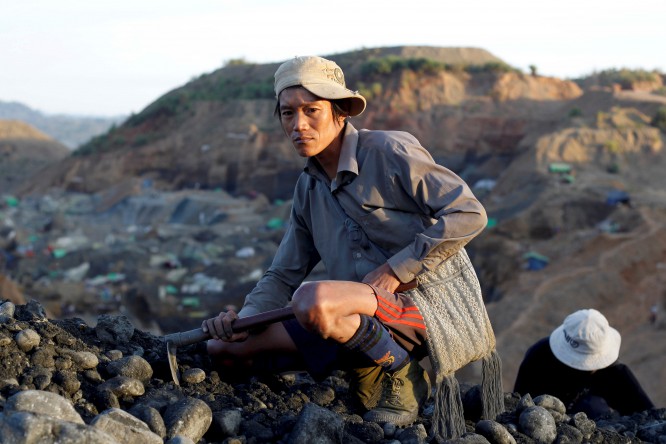Burma’s billion-dollar jade industry needs a reformed legal framework to release it from the grip of the military elites, drug lords and crony companies, says a British transparency watchdog.
A dramatic overhaul of the system, with new safeguards in place when awarding permits should be implemented, urged Global Witness in a statement released on Friday in response to the US announcement that it would lift all remaining sanctions on Burma, officially known as Myanmar.
Global Witness’ groundbreaking 2015 report revealed that a secret jade trade was operating in the north of the country worth up to US$31 billion dollars, controlled largely by the former ruling military junta.
“Aung San Suu Kyi has recognised the need for corruption to be tackled; the question is what does that mean in practice?” Juman Kubba, senior campaigner at the British-based organisation.
Kubba supports the visa bans to remain against notorious figures like former dictator Than Shwe, along with counter-narcotics sanctions and indictments over key jade players such as drug lord Wei Hsueh Kang. She also said that transparency measures, including making public the real owners of companies in jade mines and other key industries, should be ensured through initiatives such as the Extractive Industries Transparency Initiative (EITI), need to be considered.
Burma has signed up to the EITI–but it is still in the process of implementing it.
“The point of EITI is to tackle corruption by making more data available,” said Kubba in an interview with DVB on Monday. However she warns, “it can only make a difference if it is implemented properly.”
At a press conference at the US embassy on Tuesday, Ambassador Scot Marciel said the targeted sanctions list of 104 names–both individuals and companies–were lifted as the presence of the sanctions “discouraged investment more broadly.”
Ambassador Marciel confirmed that the US administration has not made any move to change the US 2008 JADE (Junta’s Anti-Democratic Efforts) Act–which also includes a provision that bars generals and their cronies from acquiring visas to enter the United States.
He added that the US will take a back step and let the government lead the way with cracking down on corruption: “Now you have an elected civilian government [and] increasingly the people of the country will be looking more to its own elected leaders to deal with these issues; to deal with the regulatory environment and fight corruption or to tackle illegal jade trade.”
In July, the government suspended all jade licences, until a reformed legal framework was made.
“Burma is revising the legal framework for its gem sector so there is definitely room to bring in some transparency provisions–such as opening up bidding processes for new permits, disclosing the terms of licences and requiring companies to publish who owns and controls them.” said Kubba.
Economist Sean Turnell, an expert on Burma’s economy, said he supports the recommendations made by Global Witness, adding that although they view the lifting of the sanctions as too soon, “they give constructive comments to that particular industry.”
Turnell says laws should also strengthen the tough stance against corrupt jade trading. “There’s a new investment law coming and Burma must adhere to money laundering international procedures,” says Turnell, but agrees that the pressing issue is that “it has to be done properly–that’s meant to exclude criminal dirty money.”
[related]
Aung Gyi, the president of Gemstones Business Association Sagaing Division, said he supports the lifting of the US sanctions but also noted that the targeted sanctions from the JADE Act should remain, to separate the good from the bad jade organisations.
He said, “The sanctions should remain on businessmen if they are not honest and lack transparency. If jade businesses are open-minded and there is evidence of good practice then this will be a good thing for our country.”
Ambassador Marciel also drew attention to the upcoming investment law due to go through parliament as a sign that Burma has “a government that can and wants to tackle these issues … rather than a foreign government from outside imposing its own regulatory structure via sanctions.”
Yet the enthusiasm towards the US sanctions lifting should be taken “with a pinch of salt” says Kubba, as she says the investor environment first needs to be improved.
Sharing resources
In a report released earlier this year, the US-based charity Natural Resource Governance Institute (NRGI) recommended the redistribution of resource revenues to include ethnic groups. Matthieu Salomon, Burma manager for the group, suggested that there needs to be a national master plan for the jade industry with all stakeholders taking part in the discussion, not just from the top down.
“It needs to be discussed what can happen on a regional level and national level–how can you share roles and responsibilities with natural resources, including the local communities,” said Salomon, in a phone interview with DVB on Tuesday.
Ownership of natural resources including the jade industry is widely seen as one of the drivers in the Kachin State conflict between the Burmese army and the Kachin Independence Organisation.
Kubba echoes the call for resource-sharing. “I think the sharing of resources is really important to the peace process.” She continues, “when we talked to the local communities [in Kachin State] they said it is not just about the money, it’s about who is getting to make the decisions.”



